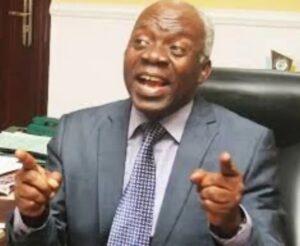Falana Criticizes Tinubu’s Economic Strategy, Raises Alarm Over Soaring Poverty and Middle-Class Decline
Falana Criticizes Tinubu’s Economic Strategy, Raises Alarm Over Soaring Poverty and Middle-Class Decline

Femi Falana
Prominent human rights lawyer and Senior Advocate of Nigeria (SAN), Femi Falana, has delivered a sharp critique of President Bola Tinubu’s economic policies, warning that the government’s current approach is exacerbating poverty and eroding the country’s middle class.
Appearing on Politics Today, a programme on Channels Television, Falana described the administration’s economic direction as a rigid application of “neo-liberal” principles that have worsened conditions for ordinary Nigerians.
“While the President is asking APC governors to do more to alleviate hardship, the reality on the ground is that life is becoming increasingly difficult for most Nigerians,” Falana noted.
He argued that the government’s strict adherence to market-driven reforms is fueling economic inequality. “These policies are pushing more Nigerians below the poverty line. If we’re serious about tackling poverty, then these strategies need urgent reassessment,” he said.
Falana took particular issue with ongoing privatisation efforts, asserting that they contradict efforts to reduce inequality. “You can’t claim to be fighting income disparity while transferring public assets into private hands under the guise of privatisation,” he said.
According to the SAN, many citizens are now struggling to afford even basic necessities, and what used to be a robust middle class has virtually disappeared.
Since assuming office in May 2023, President Tinubu has introduced major economic reforms, including the removal of fuel subsidies and the floating of the naira. While the government argues these steps are necessary to stabilise the economy, Falana insists they have instead led to soaring inflation, unaffordable food prices, and rising transportation costs.
He called for a complete policy overhaul, particularly those influenced by international financial institutions like the IMF and World Bank. “It’s time to revisit these policies. They may work on paper, but they are failing real Nigerians,” Falana said.
To cushion the impact of the economic crisis, he urged the federal government to immediately roll out and legalize key social welfare schemes under the National Social Investment Programme (NSIP), such as N-Power, school feeding initiatives, and conditional cash transfers.
“President Tinubu should urge governors to institutionalize these programmes through legislation, ensuring they are not subject to political whims,” he recommended.
Falana also condemned the recent decision by Niger State Governor Mohammed Bago to shut down Badeggi Radio 90.1 FM over allegations of incitement, describing the move as unconstitutional.
“No governor, not even the president, has the authority to unilaterally close a radio station. Such misuse of power is incompatible with a constitutional democracy,” he said, demanding the immediate reopening of the station.
He advised media proprietors to challenge such abuses legally, warning that failure to do so could set a dangerous precedent for future violations.
On the political front, Falana criticised early electioneering, stressing that governance must remain the focus. “Launching campaigns two years before an election is not only illegal—it diverts attention from the country’s urgent challenges,” he said, calling on INEC to enforce electoral rules.
He urged both ruling and opposition parties to concentrate on resolving Nigeria’s pressing issues—such as electricity shortages, decaying infrastructure, and widespread poverty—rather than stoking ethnic or religious divisions.
Falana also dismissed calls for rotating the presidency among geopolitical zones, labelling such arguments as distractions from substantive governance. “Nigerians deserve leaders who offer real solutions—not empty promises based on regional sentiments,” he concluded.
TRENDING SONGS
 NPMA Appeals to Nigerian Government for Compensation After Lagos Market Fire
NPMA Appeals to Nigerian Government for Compensation After Lagos Market Fire
 Rest Every Four Hours, FRSC Issues Safety Guide for Fasting Motorists
Rest Every Four Hours, FRSC Issues Safety Guide for Fasting Motorists
 NNPC Boss Ojulari Bags UK Energy Institute Fellowship
NNPC Boss Ojulari Bags UK Energy Institute Fellowship
 Shock in Anambra: Bride Disappears Moments Before Wedding
Shock in Anambra: Bride Disappears Moments Before Wedding
 Nigerian Woman Returns ₦330 Million Accidentally Credited to Her Account
Nigerian Woman Returns ₦330 Million Accidentally Credited to Her Account
 APC Don Reach Morocco?’ VeryDarkMan Reacts to Seyi Tinubu Poster
APC Don Reach Morocco?’ VeryDarkMan Reacts to Seyi Tinubu Poster
 Bride Breaks Down in Tears as Wedding Meals Were Kept Secretly While Guests Go Home Hungry
Bride Breaks Down in Tears as Wedding Meals Were Kept Secretly While Guests Go Home Hungry
 Odogwu by Day, Robber by Night: How Marriage Joy Turned Into Tragedy
Odogwu by Day, Robber by Night: How Marriage Joy Turned Into Tragedy
 Nigerian Officials Allegedly Pocket N4–6B Weekly Through Smuggling Cartels at Seme–Badagry Border
Nigerian Officials Allegedly Pocket N4–6B Weekly Through Smuggling Cartels at Seme–Badagry Border
 Ahmad Yerima: Naval Officer to Face No Sanctions After Clash with Wike – Matawalle
Ahmad Yerima: Naval Officer to Face No Sanctions After Clash with Wike – Matawalle
Share this post with your friends on ![]()













